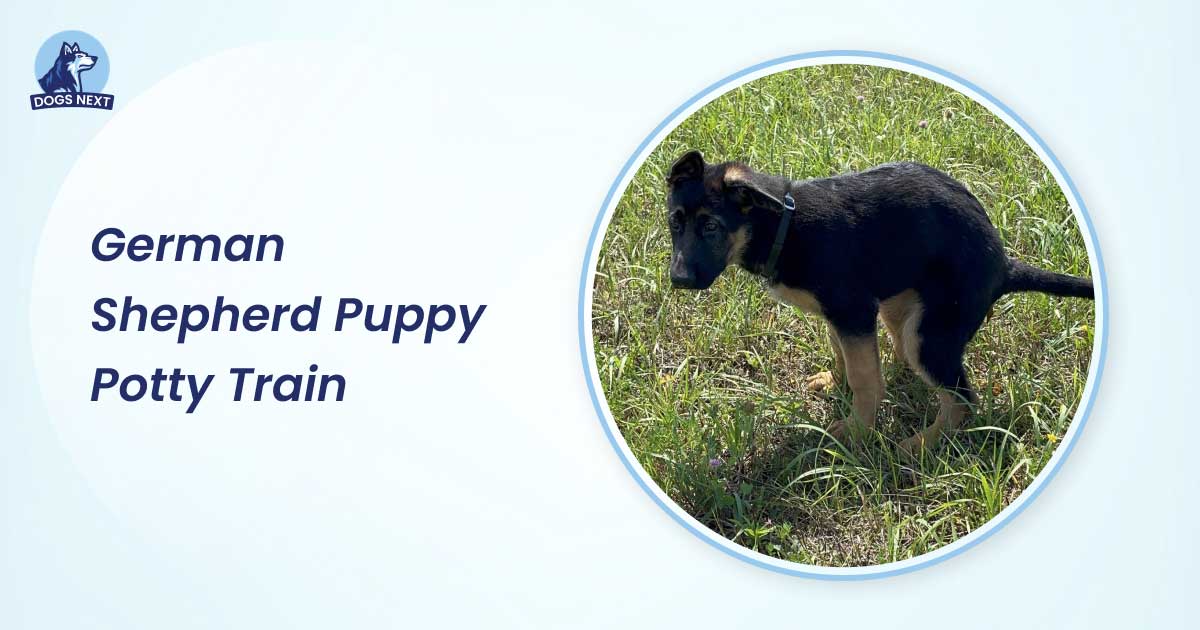Start potty training a German Shepherd puppy by establishing a consistent routine and using positive reinforcement. Take them outside frequently, especially after meals and naps.
Potty training a German Shepherd puppy can be a straightforward process with patience and consistency. Start by setting a regular schedule that includes taking your puppy outside first thing in the morning, after meals, and before bedtime. Reward them with praise and treats immediately after they eliminate outside to reinforce good behavior.
Keep a close eye on your puppy for signs that they need to go, such as sniffing or circling. Crate training can also be effective, as puppies typically avoid soiling their sleeping area. Clean any indoor accidents thoroughly to remove odors and prevent repeat incidents.
Preparing For Potty Training
Potty training your German Shepherd puppy can be a rewarding experience. Proper preparation is key to success. This guide will help you get ready for potty training your furry friend. By gathering essential supplies and setting up a designated potty area, you can make the process smooth and efficient.
Essential Supplies
Having the right supplies is crucial for effective potty training. Here is a list of items you will need:
- Crate: A crate helps your puppy learn to hold their bladder. It also provides a safe space when you cannot supervise them.
- Leash: Use a leash to guide your puppy to the potty area. This helps them understand where they should go.
- Puppy Pads: Place these in the designated potty area. They are useful for indoor training.
- Cleaning Supplies: Accidents happen. Have enzymatic cleaners ready to remove any odors.
- Treats: Reward your puppy immediately after they potty in the right spot. This reinforces good behavior.
Using a combination of these supplies will help establish a routine for your puppy. A crate can be particularly effective. Dogs naturally avoid soiling their sleeping area. A leash ensures they stay on track when heading to the potty area. Puppy pads are a great alternative if you are training indoors.
Setting A Designated Potty Area Indoors Or Outdoors
Choosing a specific spot for your puppy to potty is essential. Consistency helps them learn faster. Here are some tips for setting up a designated potty area:
- Outdoors: Choose a quiet, grassy spot. Make sure it is easily accessible.
- Indoors: Use puppy pads in a low-traffic area. This minimizes distractions.
Take your puppy to the same spot each time. They will begin to associate this area with potty time. If you are training outdoors, use a leash to guide them. This helps establish the connection. For indoor training, place the puppy pads in the chosen area. Encourage your puppy to use them consistently.
Consistency is key. Take your puppy to the potty area after meals, naps, and playtime. Praise and reward them immediately after they potty in the right spot. This positive reinforcement helps them understand they have done well.
By preparing with the right supplies and setting up a designated potty area, you can make potty training a smooth process. Your German Shepherd puppy will quickly learn where they should go, making life easier for both of you.
Establishing A Routine
Potty training a German Shepherd puppy requires patience and a structured approach. Establishing a routine is essential to make the training process smoother and more effective. This routine helps your puppy understand when and where they should relieve themselves, making your life easier and keeping your home clean.
Feeding And Potty Schedule For A German Shepherd Puppy
Creating a consistent feeding and potty schedule is vital for successful potty training. Puppies usually need to go potty after eating, drinking, playing, or sleeping. By maintaining a regular schedule, you can predict when your puppy needs to go outside.
Here’s a sample schedule to help you get started:
| Time | Activity |
| 6:00 AM | Wake up and potty |
| 7:00 AM | Breakfast and potty |
| 10:00 AM | Potty break |
| 12:00 PM | Lunch and potty |
| 3:00 PM | Potty break |
| 6:00 PM | Dinner and potty |
| 9:00 PM | Potty before bed |
In addition to a structured schedule, keep these tips in mind:
- Feed your puppy at the same times every day.
- Take them outside 10-15 minutes after each meal.
- Limit water intake before bedtime.
Importance Of Consistency In Training
Consistency is the key to successful potty training. Puppies thrive on routine and repetition. By being consistent, you help your puppy learn faster and reduce accidents.
Here are some benefits of maintaining consistency:
- Builds trust and understanding between you and your puppy.
- Reduces confusion about where and when to potty.
- Helps establish a clear communication pattern.
To ensure consistency:
- Use the same command every time you take your puppy outside.
- Take them to the same spot in your yard to potty.
- Reward your puppy with treats and praise after they go potty outside.
Remember, accidents happen. Stay patient and never punish your puppy for accidents. Instead, reinforce positive behavior and maintain a regular schedule. Your efforts will pay off, and your German Shepherd puppy will learn to potty outside consistently.
Positive Reinforcement Techniques
Potty training a German Shepherd puppy requires patience and consistency. One of the most effective methods is using positive reinforcement techniques. This approach focuses on rewarding good behavior, making the training process enjoyable for both you and your furry friend.
Treats And Praise
Using treats and praise is a powerful way to encourage your German Shepherd puppy to follow your potty training routine. Each time your puppy successfully uses the designated potty area, reward them with a treat and plenty of verbal praise. This creates a positive association with the desired behavior.
Here are some tips for using treats and praise effectively:
- Choose High-Value Treats: Use treats that your puppy loves and finds irresistible.
- Immediate Reward: Give the treat and praise immediately after they use the potty area.
- Consistent Praise: Use the same words of praise each time, like “Good job!” or “Well done!”
- Gradual Reduction: Slowly reduce the frequency of treats as your puppy becomes more consistent with their potty training.
Consider keeping a potty training chart to track your puppy’s progress:
| Date | Successful Potty | Treat Given | Notes |
| 10/01/2023 | Yes | Chicken Treat | Used backyard spot |
| 10/02/2023 | Yes | Cheese Bite | Used backyard spot |
Using Commands
Teaching your German Shepherd puppy specific commands during potty training helps them understand what you expect. Consistent use of commands reinforces the desired behavior and makes the training process smoother.
Follow these steps to use commands effectively:
- Choose a Command: Pick a simple command like “Go potty” or “Do your business.”
- Consistent Use: Use the command every time you take your puppy to the designated potty area.
- Positive Reinforcement: When your puppy follows the command, immediately reward them with a treat and praise.
- Stay Patient: Be patient and give your puppy time to understand and follow the command.
Here’s an example of a potty training command routine:
Step 1: Take your puppy to the potty area.
Step 2: Say the command “Go potty” in a clear, firm voice.
Step 3: Wait for your puppy to respond.
Step 4: Reward them immediately after they use the potty area.
Using commands and positive reinforcement together can make potty training your German Shepherd puppy a positive and successful experience.
Handling Accidents And Setbacks
Training a German Shepherd puppy to use the potty can be a challenging yet rewarding task. Accidents and setbacks are a natural part of this process. It’s important to handle these situations with patience and consistency. This section will guide you on how to properly respond when your puppy has an accident and common mistakes to avoid during potty training.
How To Properly Respond When Your Puppy Has An Accident
Accidents are bound to happen during the potty training process. Knowing how to respond can make a huge difference in your puppy’s learning curve.
Stay Calm: Your reaction can affect your puppy’s behavior. Stay calm and avoid shouting or punishing your puppy.
Immediate Clean-Up: Clean the area immediately to prevent your puppy from going there again. Use an enzymatic cleaner to remove all traces of the accident.
Redirect to the Proper Spot: If you catch your puppy in the act, gently pick them up and take them to their potty spot. Praise them if they finish there.
- Consistency: Always take your puppy to the same spot.
- Positive Reinforcement: Reward your puppy with treats and praise when they go in the correct spot.
Remember, patience is key. Puppies take time to learn, and positive reinforcement will make the process smoother.
Common Mistakes To Avoid During Potty Training
Avoiding common mistakes can help speed up the potty training process and make it more effective.
Inconsistent Schedule: Dogs thrive on routine. Keep a consistent feeding and potty schedule to help them understand when it’s time to go.
Punishing Your Puppy: Punishment can create fear and anxiety, making training harder. Always use positive reinforcement.
Ignoring Signs: Puppies show signs when they need to go, like sniffing or circling. Pay attention to these signs to prevent accidents.
Lack of Supervision: Puppies need supervision. Keep an eye on them, especially after meals and naps.
| Common Mistake | Why It’s a Problem |
| Inconsistent Schedule | Puppy gets confused about potty times |
| Punishing Puppy | Creates fear, hinders learning |
| Ignoring Signs | Leads to more accidents |
| Lack of Supervision | Can’t catch accidents in time |
Avoiding these common mistakes can make the potty training process smoother and faster. Stay consistent, patient, and always use positive reinforcement to help your German Shepherd puppy succeed.
When To Expect Success
Training a German Shepherd puppy to use the potty is a rewarding yet challenging process. Many owners wonder when to expect success. This guide breaks down the typical timeline and signs to look for to know when your puppy is fully potty trained.
Typical Timeline For Fully Potty Training
Every puppy is different, but German Shepherd puppies typically follow a general timeline for potty training. Here’s what you can expect:
- 8-12 weeks: Start introducing the puppy to a designated potty area. Frequent trips outside are crucial.
- 12-16 weeks: The puppy begins to understand where to potty. Accidents will still happen but should be less frequent.
- 4-6 months: Better bladder control develops. The puppy can hold it longer and starts signaling when they need to go.
- 6-8 months: Most German Shepherd puppies will be mostly potty trained by this age. Occasional accidents may still occur.
- 8-12 months: Full potty training is usually achieved. The puppy consistently uses the designated potty area without accidents.
Consistency is key during the potty training process. Set a routine and stick to it. Frequent potty breaks, especially after meals, playtime, and naps, help reinforce good habits.
How To Know When Your Puppy Is Potty Trained
Identifying when your puppy is fully potty trained involves watching for specific signs. Here are some indicators:
| Indicator | Description |
| Accident-Free | Your puppy has not had an accident in the house for at least one month. |
| Signaling | The puppy consistently signals, such as barking or scratching at the door, when they need to go outside. |
| Holds Bladder | The puppy can hold their bladder for longer periods, matching their age in months (up to 8 hours). |
| Follows Commands | The puppy responds to commands like “go potty” and uses the designated area. |
Positive reinforcement is crucial. Reward your puppy with treats and praise each time they use the potty area correctly. Consistency and patience are your best tools in this journey. By observing these indicators, you can confidently say that your German Shepherd puppy is potty trained.
Frequently Asked Questions
How Long To Potty Train A German Shepherd Puppy?
Potty training a German Shepherd puppy usually takes 4-6 months. Consistency and patience are key for success.
What Age To Start Potty Training German Shepherd?
Begin potty training your German Shepherd puppy at 8 weeks old. Early training helps establish good habits.
How Often Should I Take My Puppy Outside?
Take your German Shepherd puppy outside every 2-3 hours. Frequent trips help prevent accidents and reinforce training.
Why Is My Puppy Having Accidents?
Accidents can happen due to inconsistency, distractions, or medical issues. Ensure a consistent routine and consult a vet if needed.
Conclusion
Potty training your German Shepherd puppy requires patience and consistency. Use positive reinforcement to encourage good behavior. Stick to a regular schedule for best results. A well-trained puppy will lead to a happy household. Follow these tips, and you’ll soon enjoy a well-behaved furry friend.
Happy training!

I’m David, an expert contributor and writer, with two furry friends of my own, I know the challenges of raising and caring for dogs. From training to nutrition and health, my goal is to provide valuable insights and advice to help create strong bonds and happy, healthy lives. Find me in Twitter.




